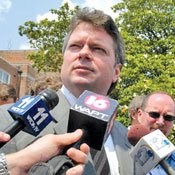Mississippi Attorney General Jim Hood wants the U.S. to change its bankruptcy laws to protect homeowners from foreclosure. "Despite the best efforts of state and federal government regulators to engage servicers in voluntary loan modifications to avoid unnecessary foreclosures, further action to spur meaningful modifications must be taken," Hood said in a statement.
Hood is joining attorneys general in 21 other states and the District of Columbia in urging U.S. House and Senate leaders to amend the U.S. Bankruptcy Code to permit federal bankruptcy courts to step in and adjust home mortgages.
The attorneys general complain that many of the loans prone to foreclosure or default are securitized, and contain more than one investment stakeholder, all of whom may decide to modify the loan and encumber the bankruptcy process.
Hood and the other attorneys general want more losses to be shared between homeowners and loan holders with homeowners being required to pay the loan they originally bought into and the mortgage holder responsible for any unsecured portion of the debt that exceeds the value of the home, should federal Bankruptcy Court order a loan modification. The argument is that a homeowner with a stable income could keep the home (and a tolerable, realistic mortgage) while the mortgage holder gets a steady stream of income in lieu of the deficit of an outright foreclosure sale.
Mississippi Association of Mortgage Brokers President Jeff Farnham did not immediately return calls.
Hood argues that federal Bankruptcy Court already contains staff people to handle the law change, and that no new regulations or tax money would be required to implement it.
______________
Verbatim statement from Attorney General's office:
Jackson, MS * Attorney General Jim Hood along with the Attorneys General of 21 other states and the District of Columbia have sent a letter to U.S. House and Senate Leadership urging them to amend the U.S. Bankruptcy Code to permit federal Bankruptcy Courts to protect families from foreclosure. The letter also highlights the positive impact the amendment may provide to local and global economies.
"Despite the best efforts of state and federal government regulators to engage servicers in voluntary loan modifications to avoid unnecessary foreclosures, further action to spur meaningful modifications must be taken," said Attorney General Jim Hood.
For instance: The most troubled mortgages are securitized and therefore multiple stakeholders may be involved in the decision to modify mortgage loans, causing a continued paralysis.
The multi-state Foreclosure Prevention Working Group released a report compiled from data from 13 major servicers in September 2008 showing that voluntary loan modification measures have fallen short. The recently-enacted federal "Hope for Homeowners" program has generated little interest from mortgage holders. The Department of Housing and Urban
Development (HUD) recently reported that only 111 applications had been submitted nationwide. Under the amendment urged by the Attorneys General, losses and benefits
would be shared between homeowners and investors. If a federal Bankruptcy Court ordered a loan modification, the homeowner would be required to pay the loan based on the current secured value and the mortgage holder may be required to absorb the unsecured portion of the debt which exceeds the value of the home. A homeowner with regular income will retain his or her home while paying a sustainable mortgage. The mortgage holder receives a steady stream of income while avoiding the losses and expenses incident to a
foreclosure sale.
The AG's letter highlights the reasons that the bankruptcy system is well-equipped to handle this crisis. With approximately 300 judges experienced in valuing property, no new agency, regulations or personnel are needed to implement the amendment. The proposal could take effect immediately and should not cost taxpayers anything. The Attorneys General do not anticipate an increase in bankruptcy filings by passing such an amendment; instead they believe such a measure will likely motivate mortgage servicers and secondary market investors to achieve sustainable loan modifications.
###



Comments
Use the comment form below to begin a discussion about this content.